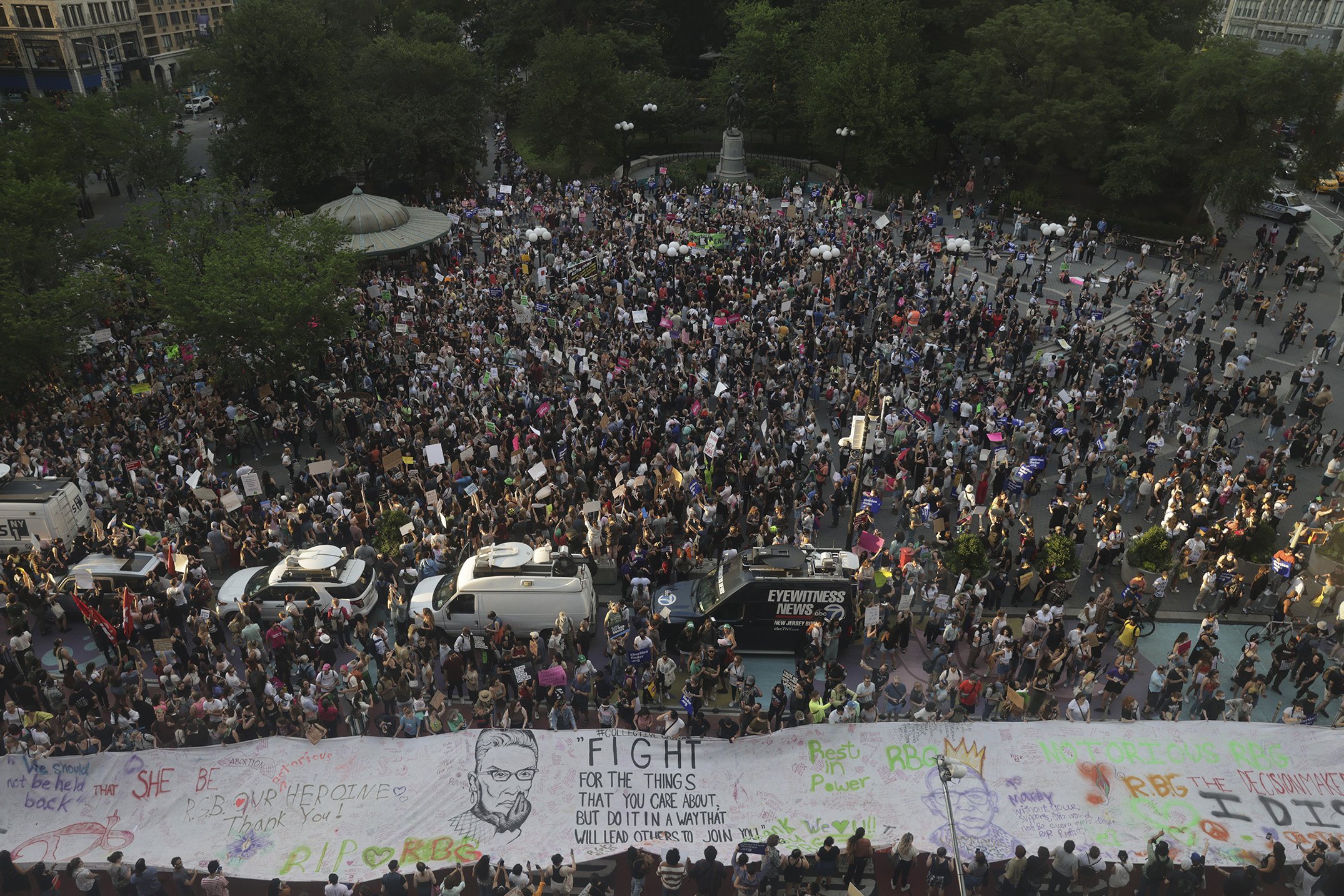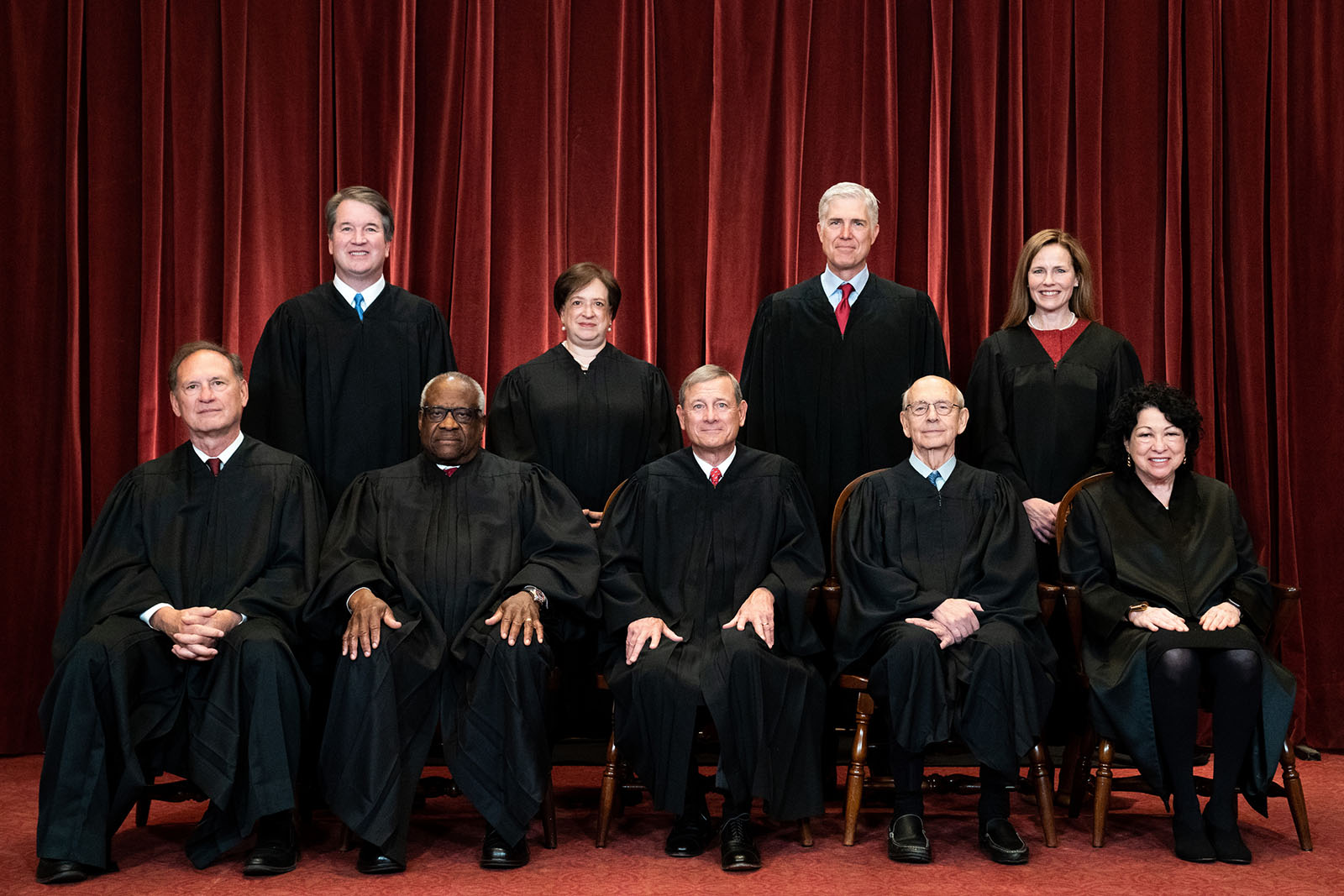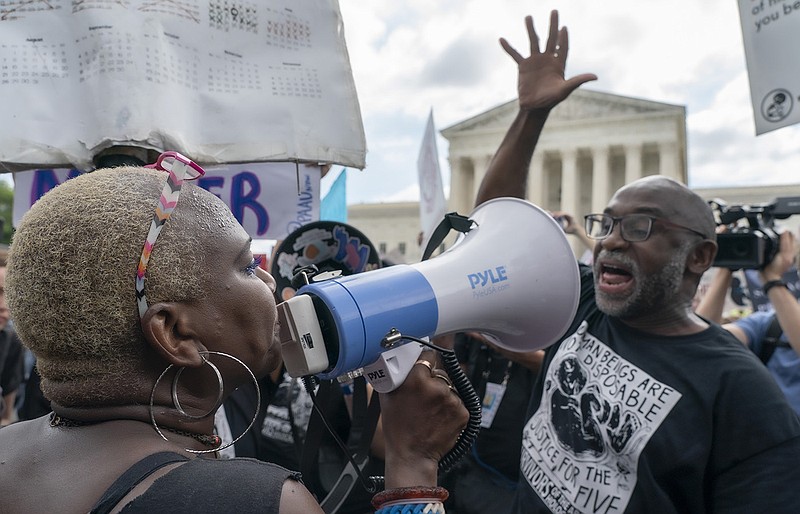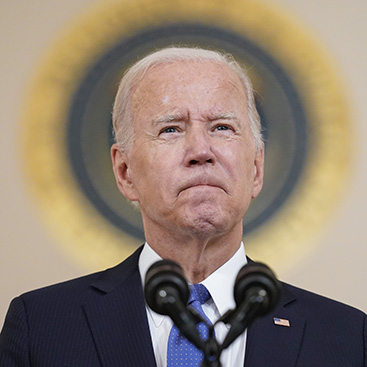WASHINGTON -- The Supreme Court on Friday overruled Roe v. Wade, eliminating the constitutional right to abortion after almost 50 years, in a decision that will transform American life, reshape the nation's politics and lead to all but total bans on the procedure in about half of the states.
"Roe was egregiously wrong from the start," Justice Samuel Alito wrote for the majority in the decision.
The ruling will vindicate a decadeslong Republican project of installing conservative justices prepared to reject the precedent, which had been repeatedly reaffirmed by earlier courts.
It will also be one of the signal legacies of former President Donald Trump, who vowed to name justices who would overrule Roe. All three of his appointees -- Neil Gorsuch, Brett Kavanaugh and Amy Coney Barrett -- as well as Justice Clarence Thomas joined Alito in the 5-4 ruling.
Trump praised the ruling, telling Fox News that it "will work out for everybody."
In the case before them, the justices voted 6-3 vote to uphold a Mississippi law enacted in 2018 by the Republican-dominated Legislature banning most abortions after 15 weeks. But Chief Justice John Roberts did not join the majority in overturning Roe v. Wade, and criticized his conservative colleagues for taking the additional step of overturning Roe and Planned Parenthood v. Casey, a subsequent case decided in the early 1990s that reaffirmed the constitutional right to abortion.
The reasoning in Roe "was exceptionally weak, and the decision has had damaging consequences," Alito wrote. "And far from bringing about a national settlement of the abortion issue, Roe and Casey have enflamed debate and deepened division. It is time to heed the Constitution and return the issue of abortion to the people's elected representatives."
Abortion foes cheered the ruling, but abortion-rights supporters, including President Joe Biden, expressed dismay and pledged to fight to restore the rights.
"It's a sad day for the court and for the country," Biden said at the White House. He urged voters to make it a defining issue in the November elections, declaring, "This decision must not be the final word."
The Biden administration and other defenders of abortion rights have warned that a decision overturning Roe also would threaten other high court decisions in favor of gay rights and even potentially contraception.
U.S. Solicitor General Elizabeth Prelogar, representing the Biden administration, said if the court did not protect its precedents, the restriction or even prohibition of abortion would be "severe and swift."
"If this court renounces the liberty interests recognized in Roe and reaffirmed in Casey, it would be an unprecedented contraction of individual rights and a stark departure from principles of stare decisis," Prelogar said.
Attorney General Merrick Garland said in a statement the Justice Department will protect providers and those seeking abortions in states where it is legal and also "work with other arms of the federal government that seek to use their lawful authorities to protect and preserve access to reproductive care."
In particular, Garland said the federal Food and Drug Administration has approved the use of Mifepristone for medication abortions.
Pregnant women considering abortions already had been dealing with a near-complete ban in Oklahoma. Another half-dozen states, including Texas, have near-total bans or prohibitions after 6 weeks of pregnancy, before many women know they are pregnant.
In Ohio, a ban on most abortions at the first detectable fetal heartbeat became the law when a federal judge dissolved an injunction that had kept the measure on hold for nearly three years. And Utah's law was triggered by the ruling, going into effect with narrow exceptions.
Mississippi, Alabama, Kentucky and Missouri are among 13 states, mainly in the South and Midwest, that already have laws on the books to ban abortion in the event Roe was overturned. Other bans are likely to follow.
Clinics in at least eight other states -- Alabama, Arizona, Arkansas, Kentucky, Missouri, South Dakota, Wisconsin and West Virginia -- stopped performing abortions after Friday's decision.
Outside the Supreme Court, a crowd of protesters grew as the day went on. And a number of companies said they would cover travel expenses for employees to get abortions.
In a joint dissent, Justices Stephen Breyer, Sonia Sotomayor and Elena Kagan wrote that the court had done grave damage to women's equality and its own legitimacy.
"A new and bare majority of this court -- acting at practically the first moment possible -- overrules Roe and Casey," they wrote, adding that the majority had issued "a decision greenlighting even total abortion bans."
The dissent concluded, "With sorrow -- for this court, but more, for the many millions of American women who have today lost a fundamental constitutional protection -- we dissent."
QUESTIONS REMAIN
The decision left important questions unanswered and revealed tensions among the five justices in the majority.
One open question was whether the Constitution required exceptions to abortion bans for the life or health of the mother, for victims of rape or incest or for fetal disabilities. The majority opinion noted that Mississippi law made exceptions for medical emergencies and fetal abnormalities, but it did not say that those exceptions were required.
In a concurring opinion, Kavanaugh indicated that an exception for the life of the mother may be required, but he did not say so in so many words.
"Abortion statutes traditionally and currently provide for an exception when an abortion is necessary to protect the life of the mother," he wrote. "Some statutes also provide other exceptions."
But some of the recent state laws were close to categorical, the dissenters wrote.
"Some states have enacted laws extending to all forms of abortion procedure, including taking medication in one's own home," the dissenting opinion said. "They have passed laws without any exceptions for when the woman is the victim of rape or incest. Under those laws, a woman will have to bear her rapist's child or a young girl no matter if doing so will destroy her life."
Another open question is whether other precedents are now at risk.
Alito said the court's ruling was limited.
"To ensure that our decision is not misunderstood or mischaracterized," he wrote, "we emphasize that our decision concerns the constitutional right to abortion and no other right. Nothing in this opinion should be understood to cast doubt on precedents that do not concern abortion."
But Thomas issued a concurring opinion that sent a different message. He wrote that it was strictly true that the majority opinion addressed only abortion, but he said its logic required the court to reconsider decisions about contraception, gay sex and same-sex marriage.
Kavanaugh took the opposite approach in his own concurring opinion, saying the precedents identified by Thomas were secure.
The dissenters, noting that Thomas "is not with the program," said "no one should be confident that his majority is done with its work."
Promises, the dissenters said, were pointless.
Roberts agreed with upholding the Mississippi law and allowing some abortion prohibitions before viability, the point at which a fetus could survive outside the womb. That line, about 22 to 24 weeks, was established in the court's previous rulings.
But he found fault with his conservative colleagues' haste, and worried for the court's credibility.
The chief justice added, "The court's decision to overrule Roe and Casey is a serious jolt to the legal system -- regardless of how you view those cases. A narrower decision rejecting the misguided viability line would be markedly less unsettling, and nothing more is needed to decide this case."
Alito, once a close ally of Roberts, said that was a recipe for turmoil.
"If we held only that Mississippi's 15-week rule is constitutional, we would soon be called upon to pass on the constitutionality of a panoply of laws with shorter deadlines or no deadline at all," he wrote. "The 'measured course' charted by the concurrence would be fraught with turmoil until the court answered the question that the concurrence seeks to defer."
MISSISSIPPI CHALLENGE
In challenging the law, Mississippi's sole abortion clinic focused on the 14th Amendment, which says that states may not "deprive any person of life, liberty or property without due process of law." Alito wrote that the amendment, adopted in 1868, had not been understood to address abortion, which he said was at the time a crime in most states.
The joint dissent responded that only men had participated in the adoption of the amendment.
"So it is perhaps not so surprising," they wrote, "that the ratifiers were not perfectly attuned to the importance of reproductive rights for women's liberty, or for their capacity to participate as equal members of our nation."
These days, Alito wrote, women have political clout.
"In the last election in November 2020, women, who make up around 51.5% of the population of Mississippi, constituted 55.5% of the voters who cast ballots," he wrote.
In his concurring opinion, Kavanaugh wrote that states could not forbid their residents from traveling to other states to obtain abortions. That was scant comfort for women too poor to travel, the dissenters responded.
They added that the majority had left open the possibility that Congress could enact a nationwide ban. Were that to happen, "the challenge for a woman will be to finance a trip not to New York [or] California but to Toronto."
When the court decided Roe in 1973, it established a framework to govern abortion regulation based on the trimesters of pregnancy.
In the first trimester, it allowed almost no regulations. In the second, it allowed regulations to protect women's health. In the third, it allowed states to ban abortions so long as exceptions were made to protect the life and health of the mother.
The court discarded the trimester framework in 1992 in the Casey decision but retained what it called Roe's "essential holding" -- that women have a constitutional right to terminate their pregnancies until fetal viability.
More than 90% of abortions take place in the first 13 weeks of pregnancy, and more than half are now done with pills, not surgery, according to the Guttmacher Institute, a research group that supports abortion rights.
Two years ago, in June 2020, the Supreme Court struck down a restrictive Louisiana abortion law by a 5-4 margin, with Roberts providing the decisive vote. His concurring opinion, which expressed respect for precedent but proposed a relatively relaxed standard for evaluating restrictions, signaled an incremental approach to cutting back on abortion rights.
But that was before Justice Ruth Bader Ginsburg died that September. Her replacement by Coney Barrett, a conservative who has spoken out against "abortion on demand," changed the dynamic at the court.
WORKERS CELEBRATE
Texas Attorney General Ken Paxton sent employees home Friday to "celebrate" the overturning of Roe. v Wade, according to an email sent throughout the agency.
In the email, Paxton said the day will be an annual holiday at the state agency "to commemorate the sanctity of life."
"Today we celebrate life and the protection of the unborn with the U.S. Supreme Court's reversal of Roe v. Wade," the email stated.
The Office of the Attorney General offices was closed for the day, it read, and instructed employees to plan not to work after noon.
"Attorney General Paxton and the entire executive leadership team wish you and your families a safe and enjoyable 'Sanctity of Life' holiday," the email read.
In a statement on Roe v. Wade being overturned, Paxton said "today the question of abortion returns to the states."
"And in Texas, that question has already been answered: abortion is illegal here," the statement said. "I look forward to defending the pro-life laws of Texas and the lives of all unborn children moving forward."
Information for this article was contributed by Adam Liptak of The New York Times; by Mark Sherman, Jessica Gresko, Fatima Hussein, Nathan Ellgren, Alanna Durkin Richer, Emily Wagster Pettus, Scott Bauer, Leah Willingham, Michael Hill and Kantele Franko of The Associated Press; by Robert Barnes, Ann E. Marimow, Mariana Alfaro, Eugene Scott, John Wagner and Amy B. Wang of The Washington Post; and by Nichole Manna of the Fort Worth Star-Telegram (TNS).
 Abortion rights activists gather Friday in Manhattan in reaction to the Supreme Court ruling on abortion. “Roe was egregiously wrong from the start,” Justice Samuel Alito wrote for the majority in the decision. In a joint dissent, Justices Stephen Breyer, Sonia Sotomayor and Elena Kagan wrote that the court had done grave damage to women’s equality and its own legitimacy. (The New York Times/Jeenah Moon)
Abortion rights activists gather Friday in Manhattan in reaction to the Supreme Court ruling on abortion. “Roe was egregiously wrong from the start,” Justice Samuel Alito wrote for the majority in the decision. In a joint dissent, Justices Stephen Breyer, Sonia Sotomayor and Elena Kagan wrote that the court had done grave damage to women’s equality and its own legitimacy. (The New York Times/Jeenah Moon) Members of the U.S. Supreme Court pose for a portrait in April 2021. From left: Associate Justices Samuel Alito, Brett Kavanaugh, Clarence Thomas, Elena Kagan, Chief Justice John Roberts, Associate Justices Neil Gorsuch, Stephen Breyer, Amy Coney Barrett and Sonia Sotomayor. (The New York Times/(Erin Schaff)
Members of the U.S. Supreme Court pose for a portrait in April 2021. From left: Associate Justices Samuel Alito, Brett Kavanaugh, Clarence Thomas, Elena Kagan, Chief Justice John Roberts, Associate Justices Neil Gorsuch, Stephen Breyer, Amy Coney Barrett and Sonia Sotomayor. (The New York Times/(Erin Schaff)Gallery: United States, post-Roe

